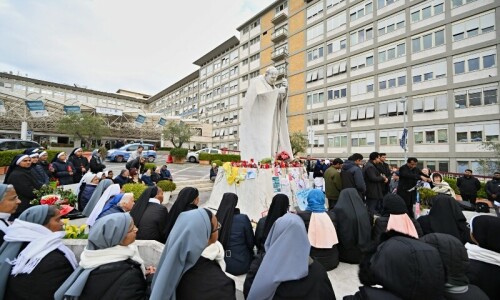Former colony demands equal relationship with Portugal
LISBON: Nearly seven years after rebel leader Jonas Savimbi was killed in combat, Angolans are doing such brisk business with Portugal that the southern European country’s largest former colony in Africa has a double-digit economic growth rate.
In the past, it was the former colonial power that was making juicy profits from the immense opportunities offered by the reconstruction of Angola, after four decades of armed conflict: the 1961-1974 fight for independence against Portugal, and the 1975-2002 civil war.
Six and a half years after Savimbi’s early 2002 death ushered in peace in this southwest African country of 17 million, Angola is investing a fair proportion of the earnings from its thriving oil industry in different economic and financial sectors in Portugal.
Angolan investments in Portugal range from oil, banking, telecommunications and diamonds to vineyards producing the world famous port wines from Oporto and the Douro valley, real estate, cement and civil engineering.
In 2007, oil sales alone, which are completely controlled by the state monopoly Sonangol, brought 18.8 billion dollars into the Angolan state coffers. Foreign oil companies in Angola are only allowed to operate in association with Sonangol.
Angola is the world’s eighth largest oil producer, and the top producer in Africa, having overtaken Nigerian output in August.
What is the country doing with the petrodollars, earnings from diamonds, international aid for reconstruction and interest from oil money placed in off-shore tax havens?
Investing in Portugal is one of the strategies that has been successful, primarily for economic and financial reasons, but also because of the strong presence of the Angolan ruling class in Portuguese business circles.
Among them are Isabel dos Santos, the eldest daughter of Angolan President José Eduardo dos Santos, and the daughter of General Manuel Hélder Vieira Dias Junior “Kopelipa”, the president’s national security adviser and counterintelligence chief.
Large companies in Portugal and the Portuguese state itself see in their former African colony a chance to escape the current economic crisis, not only by investing in Angola but also welcoming investment in the other direction.
Apart from the fact that “we live in a globalised world with open markets, attracting Angolan capital is consistent with Portugal’s history: it was a colonial power, but it has accepted ‘colonisation’ by the territories it had once conquered,” Portuguese-Angolan entrepreneur Silvio de Paula told IPS.
“I am increasingly convinced of the truth of (15th century viceroy of Portugal’s eastern empire) Afonso de Albuquerque’s celebrated phrase: ‘the mixing of races is the best dictionary of civilisations,’ because in Lisbon, where I now live, I am a pure-bred Portuguese, but when I land in Africa I am completely Angolan, in spite of my light skin,” he said.
This was de Paula’s reply to IPS asking him about the excessively nationalistic tone taken by some sectors of Portuguese society that are displeased by the strong Angolan presence in key sectors of the economy.
Editorials in some newspapers, most of which were formerly far-left and have reinvented themselves as free-market neoliberal publications, have criticised the Portuguese government of socialist Prime Minister José Sócrates for negotiating energy deals with Angola and Venezuela, countries they describe as “dictatorial.”
“I’m not defending dos Santos or (Venezuelan President Hugo) Chávez, but the fact is they have elections in their countries, while the same people who write these inflammatory editorials have never questioned oil deals with the mediaeval monarchical dictatorships in the Arabian peninsula,” de Paula said.
The apparent aim is for Angolan investment in Portugal, which dos Santos described as a country of “old friends” during a recent visit by Sócrates, to match Portuguese investments in Angola.
The example was set by Sonangol, described by analysts Cesaltina Pinto, Clara Teixeira and Francisco Galope of the Portuguese weekly Visao as “an energy company with 10,000 workers which operates as a financial instrument of the regime.”
With its debilitated economy, Portugal was only too pleased for Sonangol to become a major shareholder last year, when it acquired a 10 per cent share in the Portuguese Commercial Bank-Millennium (BCP). This year Sonangol wishes to increase its stake in BCP to 20 per cent.
Américo Amorim (dubbed “the king of cork” because he controls 67 per cent of the world market in cork oak bark) owns 33.34 per cent of shares in Galp, the Portuguese state oil company, through his company Amorim Energia, and has become the richest man in Portugal. Sonangol holds a 45 per cent stake in Amorim Energia.
These transactions were approved by Manuel Domingos Vicente, the head of Sonangol, who in February 2007 announced his intentions of listing the company on the Johannesburg and New York stock exchanges by the end of 2010.
Previously, Vicente decided to start globalising Sonangol assets by investing in Portugal, buying shares in BCP and Galp. However, he used his veto against Amorim’s idea of allowing Russian natural gas firm Gazprom to acquire a stake in Amorim Energia, and has not denied that his refusal was aimed at preserving Sonangol’s influence in the Portuguese company.
In May 2008, Vicente announced that Sonangol and the Atlantic Private Bank (BPA) of Angola had completed negotiations with BCP to acquire 49.9 per cent of BCP’s bank Millennium Angola. Sonangol also intends to purchase shares in the other Portuguese banks operating in Angola – the Banco do Espirito Santo (BES), the Banco Português de Investimento (BPI) and the state-controlled Caixa Geral de Depósitos (CGD).
As for the future, Angola has announced its interest in investing in Portugal Telecom, Electricidade de Portugal, and the pulp and paper company Portucel.
Isabel dos Santos, who attended university in Portugal, began her business career on completion of her studies and with her father’s support, beginning with agreements negotiated with the Amorim Group, BES and Portugal Telecom.
After less than five years of economic and financial activity, the Angolan president’s daughter has her own holding company, Gini, which owns a vast and complicated network of shares in sectors as diverse as telecommunications, cement and real estate.Her father’s chief adviser, Vieira Dias “Kopelipa”, has invested in the vineyard regions of the Douro river in northern Portugal, acquiring several vineyards, wineries and olive groves that produce olive oil and vintage wines of excellent quality.
His other activities include an alliance with Portuguese entrepreneur Filipe Vilaça Barreiros Cardoso, with whom he founded the company Vieira Dias & Barreiros Cardoso, specialised in restoration work and tourism.
This powerful Angolan general’s investments in Portugal are estimated at 10 billion dollars. In his own country, he also controls the Media-Nova group, in which the jewel in the crown is to be TV Zimbo, intended as the first free private television channel in Angola.
According to the three Visao analysts, “the message is clear: Angola wants to recover sovereignty over its economy.”
The former colony is demanding a relationship between equals. For every Portuguese dollar invested in Angola, an Angolan dollar will be invested in Portugal.—Dawn/IPS News Service













































